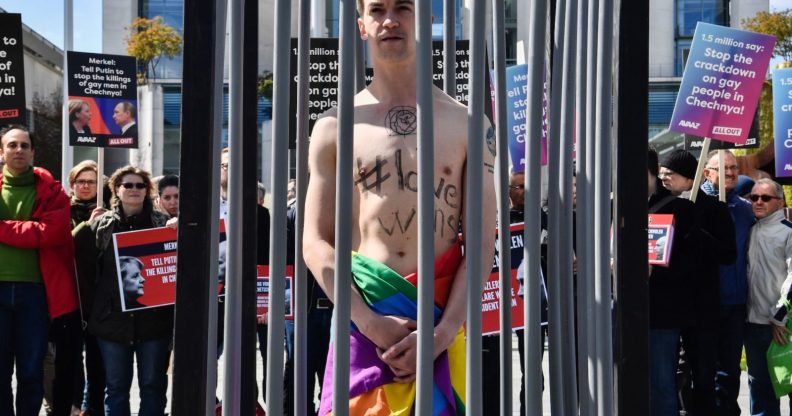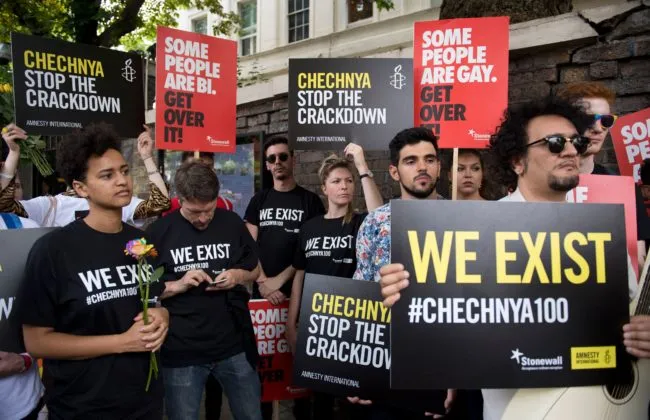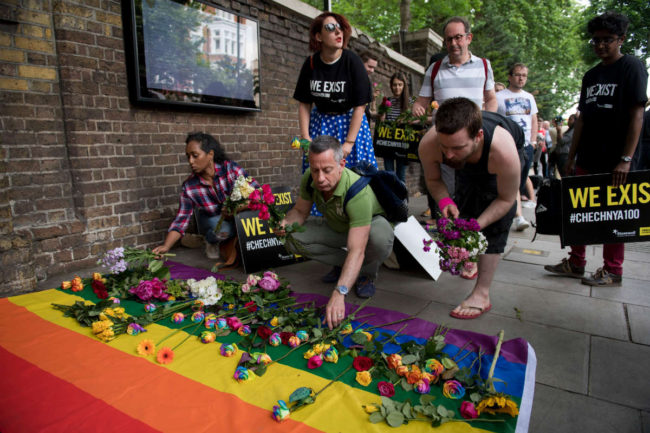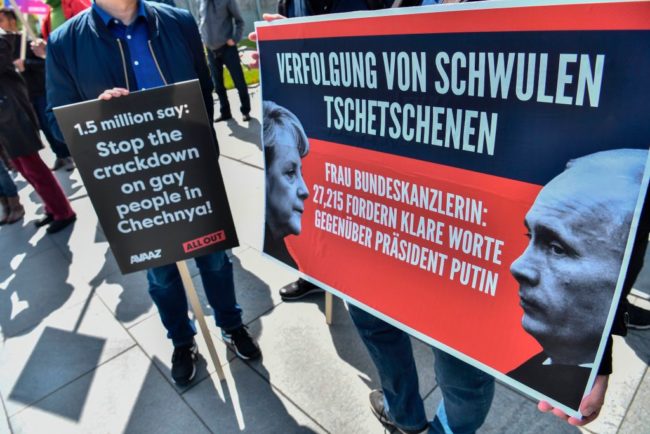Homophobic crackdowns last year were chilling, but more than ever people are rising against them

(Photo by JOHN MACDOUGALL/AFP/Getty Images)
It’s nearly a year since reports surfaced of a carefully orchestrated campaign by Chechen police in which more than a hundred men were abducted and detained within the space of a few weeks.
Marked by its extreme brutality, the region-wide crackdown left at least three men dead, while many more were tortured in detention.
The only ‘crime’ of these men was that they were suspected of being gay. The victims reported that they were tortured in order to force them to ‘out’ others.
The NGO Russian LGBT Network laid out in harrowing detail the dehumanising ordeal these men faced. They were subjected to severe beatings, electrocution, sleep deprivation. They were denied food and water, forced to sleep on concrete floors and routinely humiliated.
But state-sponsored homophobic persecution is not unique to Chechnya. Amnesty International’s latest annual report on the state of human rights reveals the alarming scale of mass arrests and persecution of LGBTI people that took place last year.

(Getty Images)
Related: Chechnya has opened concentration camps for gay men
Take Azerbaijan, for example; 83 people were detained in September in a police raid, with many beaten, denied access to lawyers and sentenced to up to three weeks in administrative detention. An Azerbaijani government official was quoted in the media saying the raid was in response to complaints from locals that LGBTI people were not “respecting others around them”.
The following month, 51 people were arrested in Indonesia when police raided a sauna in Jakarta, claiming that it was hosting a ‘gay sex party.’
And at least 76 people were arrested in Egypt, for “debauchery” under the country’s prostitution’s law, after some audience members raised a rainbow flag at a music concert in Cairo in September. Several men detained were subjected to forced anal examinations, in violation of international prohibitions against cruel, inhuman or degrading treatment.
When decriminalising homosexuality is not enough
Beyond the flagrant persecution of LGBTI communities, these cases share something else in common: of the hundreds arrested, not a single person was detained under laws that explicitly prohibit same-sex sexual activity. This is because no such laws exist in these countries.
Russia, Azerbaijan, and Egypt are not among the 72 nations that explicitly criminalise sex between adults of the same gender. Neither does Indonesia’s capital, Jakarta. Instead, police and criminal justice systems use other laws to harass, arrest and detain LGBTI people.
In Chechnya, the brutal crackdown was facilitated by a climate of homophobia and impunity for police harassment. Police can freely arrest people on inflated charges and Russian laws banning “the promotion of non-traditional sexual relationships among minors” could have also been a reason why there was no public outcry in Russia in response to this outrageous campaign.

(Getty Images)
Related: One LGBT family’s account of running away from Russia
Other similarly ambiguous or vague laws are being exploited elsewhere.
Those convicted in Azerbaijan were done so largely on the basis of police allegations that they were “resisting the police’s legitimate orders.”
And it is common practice to see scores of people charged with “habitual debauchery” in Egypt.
This vague indictment is one that prosecutors often like to use against LGBTI people as it is not defined under Egyptian law, meaning that although it does not specify that it criminalises sex between adults of the same sex, it is vague enough that it can be used to prosecute them.
Protesting against homophobic crackdowns works
So what does all of this tell us? Firstly, it shows that while explicit decriminalisation is needed, it is still not enough to ensure the full protection of LGBTI rights, which are also human rights. If they want to, law enforcement and other state authorities will find different ways to harass and criminalise LGBTI people and communities.
This tactic isn’t new, but 2017 saw its use becoming more widespread and increasingly flagrant. Vague laws, selectively enforced, create a chilling effect on entire communities.
But, more encouragingly, last year also demonstrated that people are more willing than ever to stand up to the persecution of LGBTI communities.
Even in countries where homosexuality is taboo and where these communities have long been targeted by police, most governments still prefer to avoid the attention that widespread global condemnation brings.

(Getty Images)
Last year more than 650,000 people around the globe joined Amnesty International to protest the arrests in Chechnya. From Brazil to Ukraine to Taiwan, activists signed petitions, protested outside embassies and stood in solidarity with LGBTI people.
Related: Chechnya refugees too traumatised to tell immigration officers they are gay
Instead of turning a blind eye to these human rights abuses – which is their usual response – the international outcry forced central Russian authorities to at least announce a “pre-investigation examination” of the reports of the purge of gay men in Chechnya.
A year on, no official investigation has been opened, which just underscores the need to keep up the pressure on Russian authorities to address this issue urgently.
The world is watching.
No-one should be harassed, arrested or killed because of who they are or who they love. Last year hundreds of thousands of people around the world showed they were ready to stand up for LGBTI rights. We need to keep doing so if we are to put an end to these brutal crackdowns.
Read Amnesty International’s full Annual Report here.

